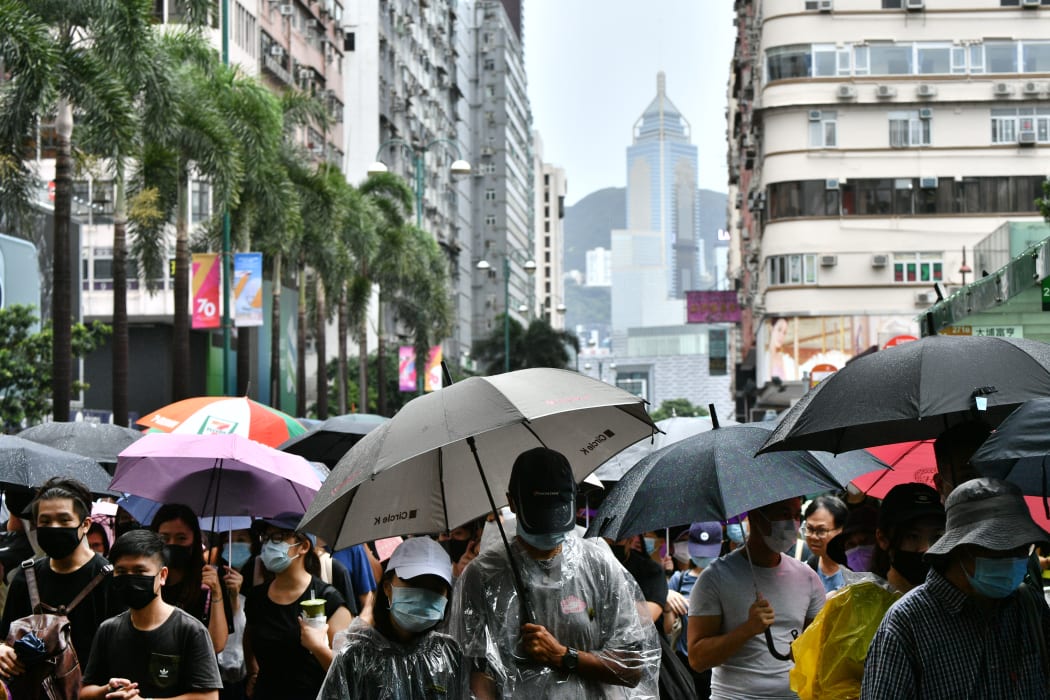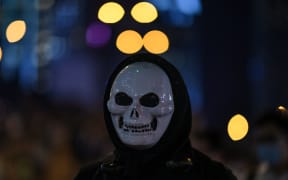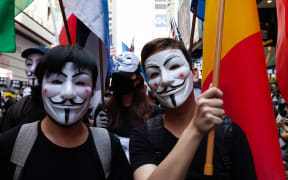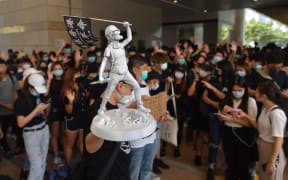Thousands of anti-government protesters have turned out for marches in Hong Kong despite pouring rain, spurred into action by a government ban on masks.

Rain did not stop thousands of masked protesters from taking to the streets in Hong Kong. Photo: AFP
Many defiantly covered their faces as they set off from several points in a co-ordinated response to the ban, which the High Court upheld on Sunday.
Metro services, which were attacked by rioters on Friday, have resumed in some parts of the Chinese city.
The masks have become the latest focus in months of pro-democracy protests.
Police use of live bullets against protesters this week, leaving two people injured, has also fuelled the unrest.
Chief executive Carrie Lam introduced the ban by invoking powers dating back to colonial rule by the British.
Demonstrators fear that democratic rights are being eroded in the semi-autonomous territory under Chinese rule.
How big are the new protests?
Many more people have turned out than on Saturday, when a small march was held in the aftermath of Friday's rioting.
Two groups set off at the same time from the Causeway Bay and Tsim Sha Tsui districts, the South China Morning Post reports.
Shops could be seen closing early while luxury and chain stores were closed in Causeway Bay.
On Friday, both businesses and railway stations were attacked by rioters.
Hosun Lee, a protester in Causeway Bay, told AFP news agency he feared more emergency laws were on the way. "The anti-face mask law is the first step," he said.
How are the authorities responding?
Ms Lam vowed on Saturday to prevent further violence, saying: "We cannot allow rioters any more to destroy our treasured Hong Kong."
She justified the law against masks as a response to the demonstrators' "extreme violence" which was, she said, endangering Hong Kong's public safety.
A second legal challenge to the mask ban, which was brought by opposition legislators, was rejected by the High Court.
The legislators had argued that the prohibition was unconstitutional because it denied the rights of free expression and free assembly.
How dangerous is the situation?
Over the months, clashes between police and activists have become increasingly violent.
On Tuesday, police shot a protester with a live bullet for the first time, wounding the 18-year-old, who was allegedly attacking a police officer.
On Friday, a boy aged 14 was shot in the leg with a live round in Yuen Long, a town to the west of the city.
A plain-clothes police officer with an unmarked police car was later set upon by rioters in the same area but officials did not link the two incidents, the South China Morning Post reports.
What is Hong Kong's status?
Hong Kong is a former British colony handed back to China in 1997.
It has a "one country, two systems" agreement that guarantees it some autonomy, and its people certain freedoms, including freedom of assembly and freedom of speech.
But those freedoms - the Basic Law - expire in 2047 and it is not clear what Hong Kong's status will then be.
- BBC




